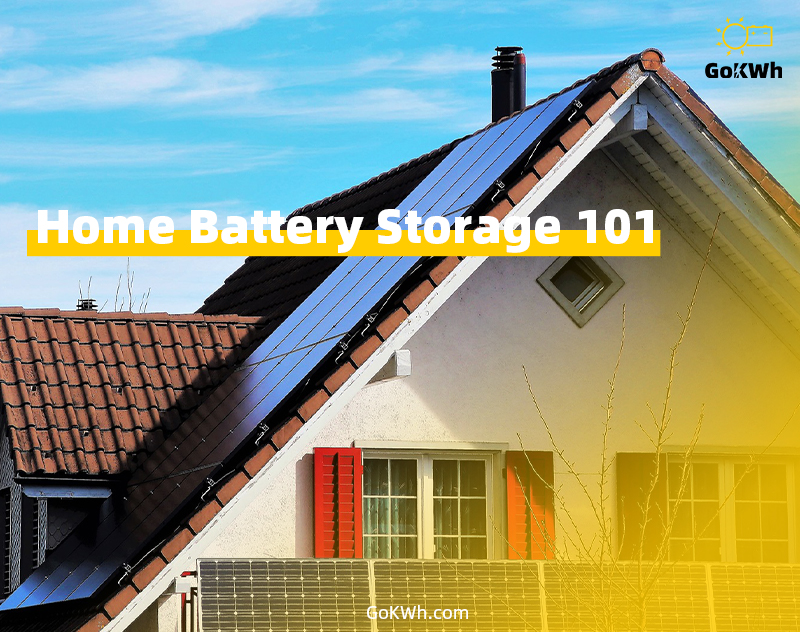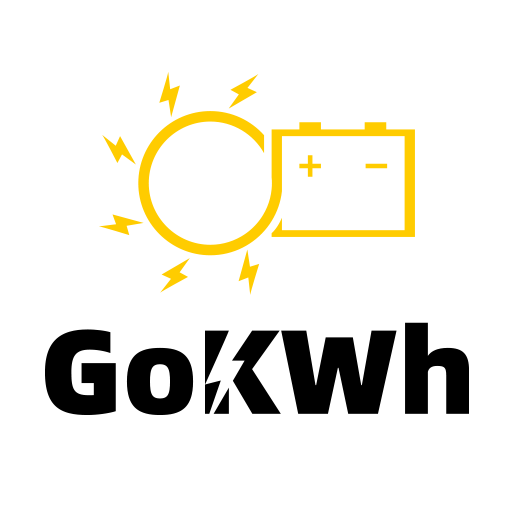e-mail us: hi@gokwh.com

Home Battery Storage 101
In order for you to obtain cheaper and cleaner electric energy, the energy storage battery 101 can help you to better understand the related knowledge of energy storage.
Here’s what you need to know before choosing a solar energy storage battery for your home:
What is home battery storage?
The energy storage battery is mainly used to store electric energy from solar energy, wind power or the local power grid. It is mainly used to store electric energy and is often used as a backup power supply for families, businesses and farms. In recent years, with the continuous development of solar energy technology, energy storage batteries can also achieve energy independence for houses.
Why get a home battery storage?
The reason why energy storage batteries can become popular in various regions is mainly due to the following three reasons:
- Maintain power supply
In case of extreme weather, natural disasters or other emergencies, the power grid may suspend power supply. If you buy and use energy storage batteries in advance, you can avoid this situation and ensure that families or facilities can use electricity normally.
- Save high electricity bills
Equipped with energy storage batteries can largely avoid high electricity bills due to time-of-use billing and high-priced billing. It can save homeowners a lot of money on their electricity bills.
- Extra income
Equip solar and energy storage systems to whole-home equipment for energy independence. In some areas, the excess electricity generated by the solar panels can even be sold back to the grid for additional revenue.
- Cleaner energy
The energy storage battery mainly generates electricity through the sun, which will not produce waste gas and garbage, which greatly reduces the damage to the environment when using diesel generator for power generation.
Isn’t the storage battery more expensive than the diesel generator?
Traditional diesel generators are usually less expensive to purchase up front, but because it requires constant investment in fuel costs and maintenance, the follow-up costs are far greater than the up-front purchase cost. In addition, when diesel generators are used, burning fuel releases carbon dioxide and other substances into the air, which are harmful to the environment.
Although the initial investment cost of household energy storage batteries is relatively large, there is almost no maintenance and fuel expenditure in the follow-up. In the process of use, it will not emit any gas into the air and make noise.
So in the long run, home energy storage batteries are a more cost-effective, efficient, and cleaner option.
Lithium iron phosphate vs. ternary lithium battery, which one should I choose?
(1)Lithium iron phosphate (LiFePO4/ LFP)
- High safety, an explosion-proof valve between positive and negative electrodes
- Overcharge and discharge will not explode or cause fire
- No memory effect
- Long service life, with a life cycle of 10-15 years
- Lightweight
- No waste gas emission, friendly to the environment
But LFP batteries have poor low temperature performance and are expensive.
(2) Ternary lithium (NCM)
- Guaranteed low-temperature performance and low-temperature resistance
- No memory effect
- As environmentally friendly as LFP batteries
- High voltage and good performance
However, MCN has poor stability, may cause explosion and fire, and is easy to be thermally decomposed. The service life is shorter than that of LFP. Generally, it can only be recycled 800 times and used for about 2-3 years.
In general, although LFP is expensive and has poor low temperature performance, it is slightly better than NCM battery in terms of safety and cost performance.
However, users in cold regions still need to focus on the situation that LFP can not be charged or work normally at low temperature, and choose the most suitable battery.
What are the common categories of energy storage systems?
There are several types of common energy storage batteries on the market:
- All-in-one ESS (build-in inverter)
- Stacked
- Wall-mounted
- On-wheels
- Rack-mounted
Do I need a permit to buy a home battery storage?
Yes, in most cities and regions, you need a license to install energy storage batteries in your home. About more information, please consult the local relevant departments.
How does the household energy storage system work?
Home energy storage systems obtain electricity through solar panels or connected to the grid. When connecting the household load and the energy storage system at the same time, the solar energy or power grid will give priority to supplying power to the household load, and the energy storage system will be charged only when there is excess power.
When a power failure occurs in the home, the energy storage system will immediately identify when the power supply is interrupted, and automatically change the switch to use the energy storage battery to power the home without manual operation.
How long will a home battery storage last?
The introduction of energy storage batteries has attracted a large number of homeowners. They may all be troubled by this problem when choosing the first energy storage battery. However, the battery life of energy storage battery involves many factors: battery capacity, battery type, use mode, the number of connected appliances and the power of appliances, etc.
Calculated as a 5 kWh storage battery:
- The 400W refrigerator can last 12.5 hours
- A 10W bulb can last for 500 hours
- Watching TV can play continuously for about 5 hours
- Indoor air conditioning cooling 6.25 hours
Equipping a home with a solar energy storage battery can ensure that some important essential appliances can keep running in case of power failure. For example, the food in the refrigerator can be kept fresh, and the mobile phone can be kept fully charged all the time.
In general, the energy solution of “solar + energy storage battery” has become the primary choice of most homeowners. Solar storage batteries also reduce your day-to-day dependence on the grid. Before purchasing, we should understand the relevant knowledge of energy storage battery in order to better select and purchase.
What equipment does the energy storage battery need to work with?
- Solar panel
Solar panels are used to absorb sunlight and convert it into electric energy. During the day, they can supply power for families and charge batteries. When there is no sunshine at night, it is convenient to use the energy storage battery to power the home.
Solar panels and energy storage batteries are the best partners. Some data show that 70% of the households that have solar panels are willing or considering adding energy storage batteries to the solar system.
- Local power grid
Another way to charge the energy storage battery. In the absence of solar panels or rainy days, the power grid can be used for charging. Charging in the low peak period of electricity charge and generating electricity with energy storage battery in the peak period of electricity charge can also achieve the purpose of saving electric charge.
- Inverter
Inverter is an important part of energy storage battery. It can convert DC power into current power so that the power can be converted into a voltage suitable for household use.
In addition, the inverter also adds a communication function, which can be linked with computers, mobile phones and other devices to monitor the status of the energy storage battery and inverter at any time.
How do I install my energy storage system?
- If you are a certified installer such as an electrician installation, you can install energy storage batteries for your home by yourself. Before installation, please confirm that the received product is well packaged and undamaged, and keep the corresponding warranty certificate.
- If you are not a professional solar installer, please contact local installers and installers to operate. Please check the relevant credentials of the installer before installation, which indicates that the installer is qualified to install your battery storage system.
The installer may shut down the house sometime during the installation, but this period should be brief. If your meter or meter box needs an upgrade, your power may need to be off for a longer period of time.
During the entire installation period, please confirm receipt of all necessary documents and save them. This is the most important document if you need to make a warranty or claim.
Note that it is also very important to learn how to properly use the energy storage battery from the installer before they leave.
What should I pay attention to when using the energy storage battery?
- If you want to extend the service life of the energy storage battery, regularly conduct a full discharge cycle for the battery.
- Place the battery at about 25 ℃ for charging and discharging. Keep away from fire sources and high temperature to avoid fire and explosion. When the battery is not in use, it should be stored in a place with low humidity and good ventilation.
- Since the self-discharge rate of the inner LFP battery of the energy storage battery is about 3% per month, please ensure that there is no load during storage and remember to charge the battery regularly.
- If the battery emits a peculiar smell, heating, discoloration, deformation or any abnormality during use, storage or charging, please stop it immediately and contact a professional for equipment inspection.
- Do not add, remove or damage the battery equipment by yourself.
Can my GoKWh battery be recycled when its service life is over?
Of course! The recovery rate of LFP used in the battery reaches 99%. There are many advantages to recycling LFP batteries:
- Reduce environmental pollution caused by randomly discarding batteries
- Reduce resource regeneration costs
- Avoid potential fire hazards
- Precise recycling to reduce classified labor
If you need to recycle, please contact the relevant local personnel.
Let’s make the environment better!
Are Home Battery Storage Worth It In 2022?
In the short term, the purchase cost of household batteries is too high compared with traditional diesel generators, and many people may still choose to buy Generators with lower costs.
However, in the long run, diesel generators will continue to increase in subsequent maintenance and fuel costs. Compared with diesel generators, energy storage batteries can be used continuously without too much maintenance in the later stage. In addition, most of the current energy storage batteries use LiFePO4 cells, which have the characteristics of high safety, long service life and many cycles. The average battery life can reach 10 years.
On the other hand, the Paris Agreement stipulates that global warming will be limited to 1.5 degrees Celsius by 2050. The emergence and utilization of solar energy have greatly promoted the implementation of this goal, and the harmful gases emitted by generators burning fuel will also harm the environment, which is not conducive to the concept of sustainable development.
